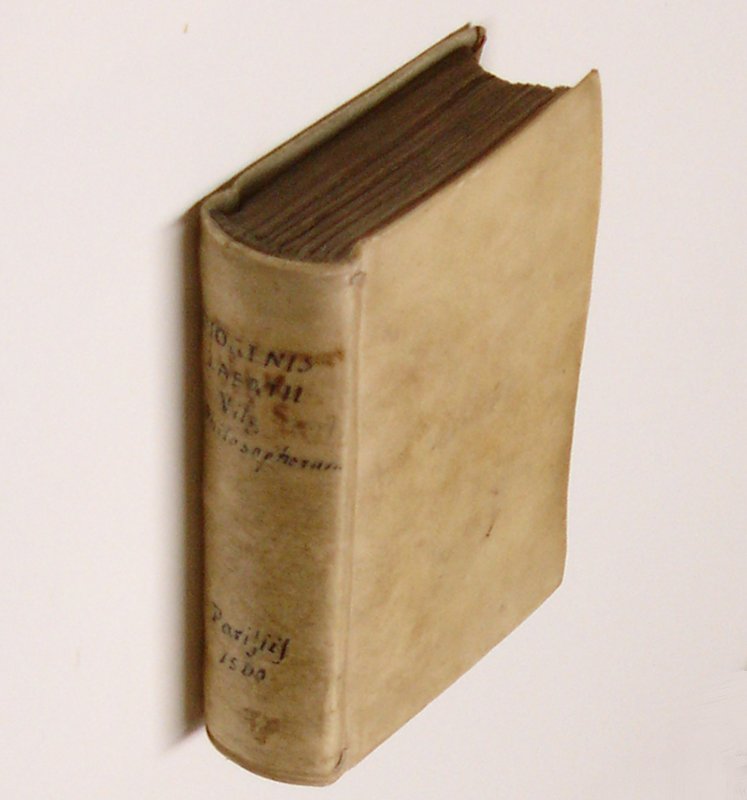DIOGENES LAERTIUS.
Diogenis Laertii De vita et moribus philosophorum libri X. Recens ad exemplar Graecum collati, ex eiusque fide cura doctissimorum virorum restituti & emendati. Cum indice nominum ac rerum locupletissimo.
Paris, (Parisiis), Apud Hieronymum de Marnef, sub Pelicano, Monte D. Hilarii, 1560.
12mo. 596,(28 index),(2 epilogue 'Candido Lectori'),(1 woodcut illustration),(1 woodcut printer's mark of De Marnef) p. Later vellum 13 cm -
The greatest known source of information about the philosophers of antiquity (
Ref: Hoffmann 1,569; Graesse 2,397, erroneously dating 1561) (
Details: 2 thongs laced through the joints. Woodcut printer's mark of De Marnef on the title (BaTyR no. 28133), depicting a pelican on his nest, feeding his young with his own blood; the motto is: 'In me mors, in me vita'. On the last page another version of De Marnef's printer's mark (BaTyR no. 2882), now depicting a griffon that holds in its claw a cubic weight to which is attached a winged globe. The cube stands for constancy and the globe for fortune; the motto is: 'Virtutis et gloriae, comes invidia'. Marnef used this version of his mark only at the end of the books he printed; This printer's mark very closely resembles that of the Lyonese printer Sébastien Gryphius, only the motto is different. Greek text and a Latin translation.) (
Condition: Vellum somewhat age-toned. Short title in ink on the back. Front flyleaf removed. Stamp on front pastedown and on the title; tiny hole in outer margins of title; 4 tiny holes in last leaf; Binder's error: he bound leaf X7, p. 333/4, probably a cancel, before leaf X3) (
Note: This is according to Graesse a repetition of the edition of 'De vita et moribus etc.' edited by Johannes Boulierius (Jean Boulier), Lyon 1556. We compared both works and conclude that Graesse is more or less right. The typesetter of the 1560 edition had most probably the 1556 edition before him. He repeats even the printed marginal remarks and annotations. But there are occasionally minute differences in the Greek text, and sometimes the 1560 edition adds an explanatory marginal remark. In book 7 p. 340, in the life of Zeno Criticus for instance, we found a printed 'varia lectio'. There 1556 has only
therizonti, 1560 adds in the margin: '* Forte
erizonti contentioso'. In 1556 the number 58 is quintaginta & octo, in 1560 Duodesexaginta. (p. 425 & 342) In the epilogue dated 1560, we read that we have here a text revised and ameliorated with the help of a manuscript 'cuius (quamvis mutili) veritate & fide non pauca restituenda, emendandaque curavit Hieronymus Marnefius Parisiensis Typographus'. (Leaf 2Q7). This activity is confirmed in the 'Extrait du Privilège du Roi', which grants Marnefius the exclusive right to publish this text 'Lequel auroit esté nouvelement reveu, visité, corrigé, additionné & augmenté', for the next six years. (Leaf A1 verso, which is the verso of the title) Immediately after this privilege, and preceding the Latin translation, we find a 3 page letter of Fr. Ambrosius addressed to Cosimo de' Medici. This letter is meant to assure the reader that this 1560 translation is a reliable old, and often printed one, based on the translation that was made by the Italian priest, theologian and Hellenist Ambrogio Traversari, O.S.B. Cam., also known as Ambrosius Traversari, or Ambrosius Camaldulensis, 1386-1439. He worked between 1424 and 1433 on this translation, which came to be widely circulated in manuscript form, and was only published in Rome in 1472. In this dedicatory letter Ambrosius Traversari tells us that he translated the 'Lives of the Philosophers' at the request of Cosimo de' Medici. ('Tibi (...) hoc opus dedicatum fuit, qui & autoritate tua in primis nos ad illud impulisti'. p. 5) The 'Lives of the Philosophers' of the Greek author Diogenes Laertius, who probably lived in the first half of the 3rd cent. A.D., is a compendium full of biographies of the ancient philosophers, from Thales to Epicurus, and their doctrines. Diogenes Laertius drew his material from earlier compilations. His reliability and value differ from passage to passage. Some give invaluable information, other passages offer mere caricature. (OCD 2nd ed. p. 348/49) It 'provides not a systematic analysis, but rather a eulogistic narrative of the course of ancient philosophy (...) of the four main classical schools, the Academy, Peripatetics, Stoics and Epicureans. Anecdotal and perhaps largely apocryphal in nature, still it gave to Renaissance humanists some conception of ancient philosophy, especially of Platonic and Epicurean thought'. (Ch.L. Stinger, 'Humanism and the Church Fathers: Ambrogio Traversari (1386-1439) and Christian antiquity in the Italian Renaissance', Albany 1977, p. 71)) (
Provenance: On the front pastedown a green stamp of 'Univ. Doz. Dr. Mag. F.F. Schwarz, Professor. A 8810 Graz, Panoramagasse 2A' with a handwritten date of acquisition '1973'. Franz Ferdinand Schwarz was from 1982 till 1996 professor of classical philology at the University of Graz, where he was born in 1934. He died in his hometown in 2001 after a long illness. (See his wikipedia lemma 'Franz Ferdinand Schwarz') On the title an old almost illegible stamp of the University of Ferrara, showing a tree in its center, and part of the legend 'Università di Ferrara') (
Collation: A - 2Q-8) (Photographs on request)
Book number: 120058 Euro 550.00
Keywords: (Oude Druk), (Rare Books), Diogenes Laertius, Greek literature, Greek philosophy, Greek text, Griechische Literatur, Latin translation, ancient philosophy, antike Philosophie, antike altertum antiquity, griechische Philosophie
 DIOGENES LAERTIUS.
DIOGENES LAERTIUS.